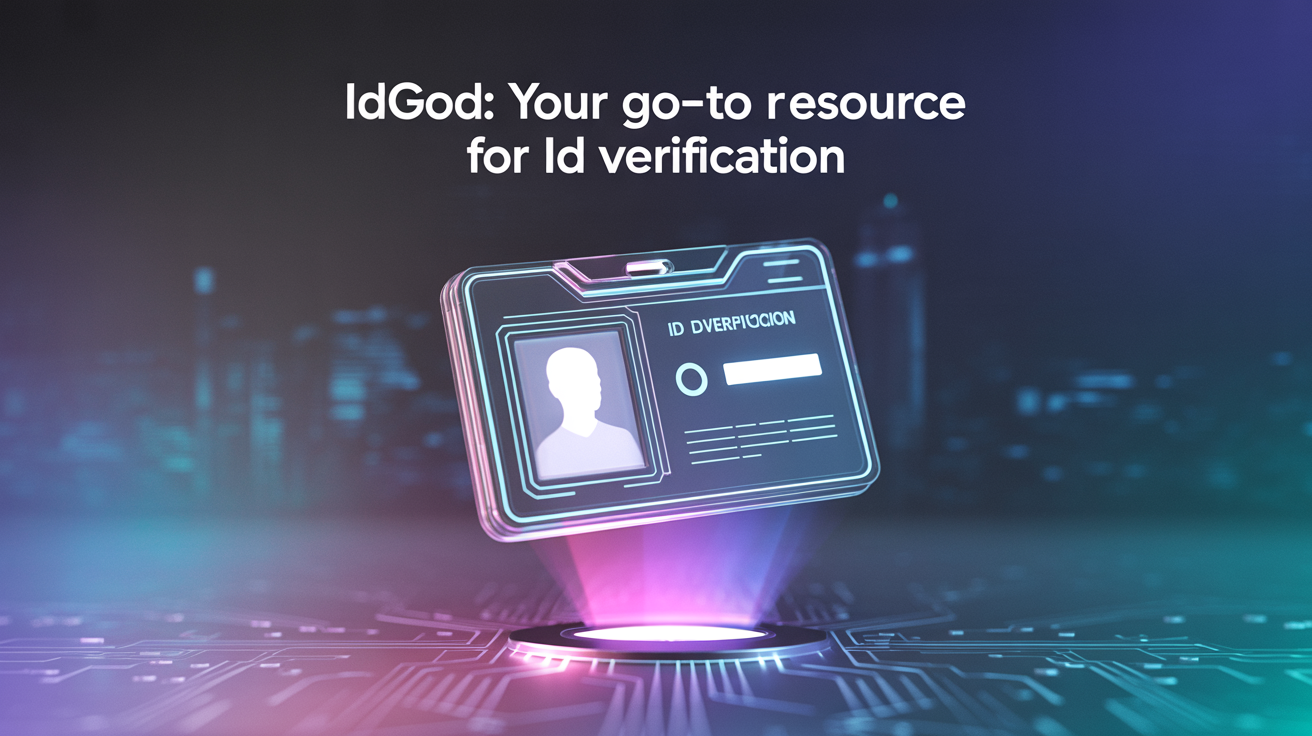In the vast realm of the internet, few topics spark as much debate as IDGod. This online service has garnered significant attention for providing users with fake identification documents. While some view it as a simple solution to bypass age restrictions and other barriers, others see it as a gateway to potential legal troubles and ethical quandaries. As more people navigate through this digital landscape in search of anonymity or convenience, IDGod remains at the forefront of discussions surrounding identity verification and fraud. Let’s delve into what makes this service so controversial and explore the implications that come with using it.
The Process of Obtaining Fake IDs
Obtaining fake IDs often begins with a simple online search. Many people stumble upon sites like IDGod, which advertise their services openly.
Once on the site, users typically fill out an order form. They provide personal details and may upload photos to match the required specifications. This process can feel surprisingly straightforward.
After placing an order, payment is usually made through cryptocurrency for anonymity. Some customers receive their IDs in discreet packaging, while others may encounter delays or issues with quality.
The allure of having a fake ID lies in its perceived accessibility. Users often believe they can navigate life’s restrictions more freely—whether it’s gaining entry to venues or purchasing age-restricted products. But this ease comes at a cost that many don’t fully consider until after they’ve committed to the decision.
Legal and Ethical Implications
The legal landscape surrounding services like IDGod is murky at best. In many jurisdictions, creating, possessing, or using a fake ID can lead to serious criminal charges. This can range from fines to imprisonment, depending on the severity of the offense and local laws.
Ethically, the act of obtaining a fake ID raises significant questions about identity and trust. It challenges social norms and legality by allowing individuals to misrepresent themselves for personal gain.
Moreover, these actions can have broader societal implications—enabling underage drinking or fraud undermines community safety and integrity. The normalization of such practices fosters an environment where deceit becomes acceptable.
As more people turn to online identity services out of desperation or curiosity, the need for awareness regarding the repercussions cannot be overstated. Understanding both legal penalties and ethical considerations is crucial in navigating this controversial terrain effectively.
Popularity and Demand for Fake IDs
The demand for fake IDs has surged in recent years. Many young adults seek these documents to bypass age restrictions at bars, clubs, and online platforms. This trend reflects a broader cultural shift towards instant access and freedom.
College campuses are hotspots for this phenomenon. Students often want to explore nightlife without waiting until they’re of legal age. The allure of gaining entry into exclusive venues drives the market.
Social media also plays a role in spreading awareness about services like IDGod. Influencers casually mention their experiences with fake IDs, normalizing the practice among younger audiences.
Moreover, some individuals use these identities for less innocuous reasons—online purchases or circumventing various regulations can be enticing motivations. As technology advances, so do methods of creating convincing fakes, making them more accessible than ever before.
Risks and Consequences for Using a Fake ID
Using a fake ID can lead to serious repercussions. Many individuals underestimate the risk involved in this seemingly harmless act. The consequences often extend beyond just legal troubles.
Law enforcement agencies take identity fraud seriously. If caught, you could face fines or even jail time. This is not just a slap on the wrist; criminal records can have lasting effects on your future opportunities.
But it’s not only about legal issues. There are personal risks as well. Using a fake ID can damage relationships with friends and family who may disapprove of such actions.
Moreover, if you’re using these services online, there’s always the threat of scams and identity theft lurking around every corner. You might end up losing money without ever receiving what you paid for, along with putting your real information at risk.
Engaging with fake IDs creates a slippery slope that many find hard to recover from once they’ve started down that path.
Alternatives to IDGod
If you’re looking for alternatives to IDGod, consider exploring legitimate identity verification services. Companies like PayPal or Venmo offer secure methods to verify your age without resorting to fake IDs.
Another option is using government-issued identification apps like Real ID. These are designed to enhance security while ensuring that personal information remains protected.
College campuses often provide student ID cards with digital features. They can serve as valid proof of age and enrollment in various contexts where verification is needed.
Some individuals also explore online document creation tools, where legal templates can assist in generating necessary paperwork for specific situations, allowing users to achieve their aims without crossing ethical boundaries.
Peer networks or community resources may offer support in obtaining the correct documentation legally and safely. Connecting with others who have navigated this landscape can provide valuable insights into more responsible choices.
Conclusion: Moral Dilemma Surrounding IDGod’s Services
The existence of services like IDGod raises fundamental questions about identity, legality, and personal responsibility. On one hand, they offer a solution for those looking to bypass age restrictions or other barriers. People may feel justified in seeking out fake identification for various reasons—whether it be for nightlife adventures or online purchases.
However, this choice often leads to a tangled web of legal ramifications and ethical dilemmas. The ease with which someone can obtain a fake ID obscures the serious consequences that could follow if caught using one. Legalities aside, there’s also the moral aspect: what does it say about our society when people are willing to go to such lengths?
For some, the allure of anonymity and freedom outweighs potential risks. Yet others see it as an escape from accountability—a dangerous precedent that can lead down a slippery slope.
Navigating these waters is complex; individuals must weigh their desires against societal norms and laws designed to protect us all. Is the temporary thrill worth long-term repercussions? This dilemma continues to fuel debates surrounding services like IDGod, leaving many pondering where they stand on authenticity versus convenience in today’s digital world.

